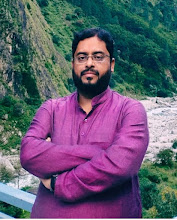By Joanna Sugden
Tracking the movement of the monsoon is a national pastime during the dying
weeks of the dry season, and asking for divine intervention in the weather
pattern is an annual ritual for many. This year, particularly so, given that
rains still
haven’t reached parts of India.
In Berhampur, a city in the eastern state of Orissa, farmers have turned to
amphibian matrimony this week in the hope of appeasing the ruler of the
clouds.
- Agence France-Presse/Getty Images
- Frog nuptials are an ancient Hindu ritual believed in some parts of India to prompt the onset of the rains.
 |
In Berhampur, a city in the eastern state of Orissa, farmers have turned to
amphibian matrimony this week in the hope of appeasing the ruler of the
clouds.
Frog nuptials are an ancient Hindu ritual believed in some parts of India to
prompt the onset of the rains. The practice involves a marriage ceremony
conducted by a priest. The two frogs are given red cloaks and, as in human Hindu
weddings, the female’s head is marked with a streak of vermillion powder. The
newlywed frogs are then released into a river.
The rite is said to have its origins in the perceived ability of frogs to
detect imminent rainfall.
Sathyabhama Das Biju, associate professor at the Department of Environmental
Studies at Delhi University, said it was difficult to give a conclusive
scientific explanation for the origin of the ritual. But the amphibian
biologist, who is an expert in the behavior of frogs, said his anecdotal
evidence suggests that frogs croak when rain is coming.
“During summer showers, I have witnessed that some species of frog (mostly
early breeders) start calling just three or four hours before rain,” Mr. Das
told India Real Time, adding that he hasn’t heard frogs calling in the dry
summer season.
“If you find an exposed frog in summer, usually it will not be calling. But
if you create a situation with water, sometimes toads may call twice or thrice,”
he said.
Even government officials are hoping for divine intervention. The
commissioner of the Municipal Corporation in Bangalore, for example, last month
asked the public to offer pujas to the rain god Lord Indra amid water shortages
caused by the delayed monsoon.
Did it work?
Shivasharanappa Khandre, public relations officer at the Bangalore Municipal
Corporation ,told India Real Time: “Last week the monsoon started in the coastal
areas. So far it has not rained heavily in Bangalore, still we are praying the
rain God to rain heavily.” “But the commissioner didn’t say we would organize prayers as has been
reported,” he added.
The state government in Bangalore had planned to experiment with cloud
seeding – releasing chemicals into clouds to induce rainfall – but Mr. Khande
said the idea has been shelved since the rains arrived on the coast.
He added that Bangalore depends heavily on hydroelectricity for its power
supply. “Without water we are having to borrow power from neighboring states, it
is a serious problem.”
In Ahmedabad, in the northwestern state of Gujarat, Brahmin priests performed
Parjanya Varuna Yajna on Sunday to invoke the rain deity. The practice involves
chanting prayers while sitting in large cooking vessels filled with water and
flower petals.
India’s weather
department said rains arrived in the state this week. The Brahmin priests
probably shouldn’t take much credit for that.
Joanna Sugden is freelance journalist living in Delhi. Before coming to India in 2011 she spent four-and-a-half years as a reporter at The Times of London, covering religion and education. You can follow her on Twitter @jhsugden.
Follow India Real Time on Twitter @indiarealtime
Courtesy: The Wall Street Journal

